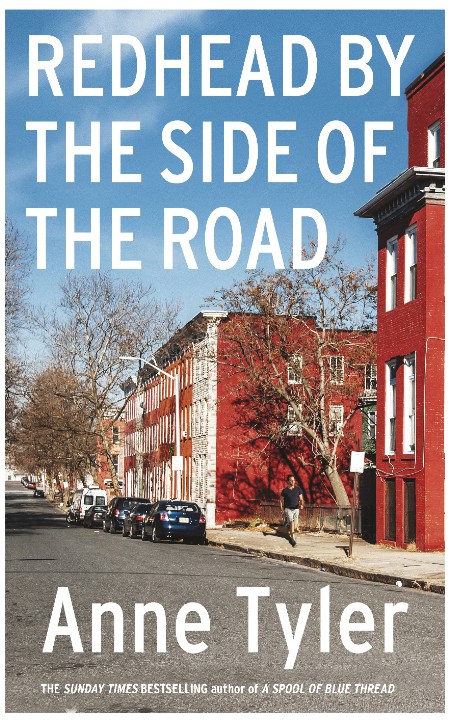
Much of the time, the way we react to life is purely instinctual, especially when we’re children and we form our defensive responses less on reason and more on emotion and a need for some kind of perceived protection.
The problem with these perfectly understandable responses to childhood trauma is that they are not always easily undone when we’re are adults, either because we don’t see even them in place or because we do, but their entrenched place in our lives is so strong and reinforced that assailing them in any way feels like a Herculean task with no possibility of success.
Micah Mortimer, the protagonist in Anne Tyler’s lyrically written novel Redhead by the Side of the Road, spends much of the narrative in the first camp, unaware that his fastidious reaction to the Bohemian chaos of his childhood is stifling his adult life which is now shuffling its way, very carefully and with specific days allocated to kitchen cleaning and overall home organisation, into the middle of his forties.
By any objective measure, Micha’s life is not a dismal failure.
Sure, he hasn’t lived up to his initial promise, the first and only member of his rambling, rambunctiously garrulous working class Baltimore family to go to college, and he has seen off girlfriend and after girlfriend, bewildered by his inability to sustain a longterm relationship.
But he has a nice, if basic, basement apartment in an apartment complex where he is also the super to a bunch of eccentric though likeable tenants, a computer business known as Tech Hermit which isn’t a roaring business though it does pay the bills, and a cosy if predictable relationship with schoolteacher Cass who he met some years earlier on a work gig.
“You have to wonder what goes through the mind of someone like Micah Mortimer. He lives alone; he keeps to himself; his routine is etched in stone.” (P. 3)
His is a perfectly reasonable, if time-controlled and minutely-measured life. (Tyler uses throughout of time and key moments in the day underscore the unimpulsive, carefully-ordered nature of Micah’s largely unadventurous life.)
But Micah, deep down, so deep down he can’t even see the origin of his dissatisfaction anymore, isn’t truly happy.
He knows it, and the endless loneliness from a life where Cass is only around when it suits her or him, and where he has set times for everything including his morning run which must happen at 7.30, is beginning to take its toll.
His though is life that remains, not so much blissfully unexamined as not examined much at all, his unhappiness with the course of things percolating up here and there, each bubble of discontent pushed down or ignored because Micah simply doesn’t know what to do with them.
One of the great gifts of Redhead by the Side of the Road is that Tyler doesn’t paint Micah some sort of inept fool which a lesser author might’ve been tempted to with cliched brushstrokes and lazy characterisation.
Rather Micah is a flawed, understandable Everyman, someone who, like all of us, wants far more from life than he is getting, but has no idea how to get it nor how to undo the childhood protective mechanisms that inhibit his adult life and which served a purpose once but are simply deadweight now.

Throughout Redhead by the Side of the Road, which ambles with nuance and an elegantly simple though affecting narrative through 178 judiciously-used pages, you come to love Micah precisely because any of us could, and maybe still are, in his position.
The appearance of an 18-year-old called Brink Adams at his door claiming to be his son and some messily-executed conversations with Cass expose Micah’s inability to cope with anything more than the unsatisfying landscape of his current life.
These two events, neither of them earth-shattering in one sense but capable of reshaping Micah’s life is he will let them, show up the glaring deficiencies in Micah’s life although it takes a great deal of time before he can see them.
Again, you don’t judge him for a second or think him an idiot, because Tyler writes with such empathy and understanding, portraying him as someone who knows there could be more to his humdrum, failed to deliver on its promise life, one his four loving older sisters tease him about constantly as being so deep in a rut it can’t see the sun anymore, but who feels powerless to discern what it is could be changed.
There is a richness to his experience of life because he is at heart a thoughtful, caring person; he just never really developed the tools to express that part of him and so consequently much of his approach to life looks more than a little clumsy or hurtful, two outcomes he doesn’t want and which you know he would change in a heartbeat if he could.
“You have to wonder what goes through the mind of such a man. Such a narrow and limited man; so closed off. He has nothing to look forward to, nothing to daydream about. He wakes on a Monday morning and the light through the slit-eyed window is a bleak, hopeless gray, and the news on the clock radio is all unspeakably sad.” (P. 167)
Written with gently evocative landscape that paints a three-dimensional picture of Micah and his inadvertently stultified life such that within the first page you understand who he is and the inertia-sapped state of his carefully-ordered existence, Redhead by the Side of the Road is an ode to the way in which lives can calcify and we can struggle to figure out where the exit to something more satisfying lives.
The beauty of Redhead by the Side of the Road, quote apart from its luminously lovely and emotionally resonant prose, which confirms Tyler as a writer of uncommonly in insightful talent, is that Micah’s journey from ordered to overrun is believable, authentic and precisely what any of us might go through.
Tyler realistically represents Micah’s small-scale but no less important than any of their bigger, more momentous and noteworthy epiphanies are entirely relatable parts of a world where creating childhood defenses against traumas big and small is fiendishly easy and seeing them at all and dealing with them in any kind of effective manner, is devilishly difficult and prone to happening not at all or very slowly, too slowly for those people in that person’s life waiting for the walls that frustrate them to fall.
It’s not an easy road but Tyler demonstrates in the immensely likeable, articulate and earnest Micah, it is one it is possible to journey down and one where you can arrive at a wholly different destination than expected, something that becomes not just possible for Micah but necessary for a character who comes to understand in the slow and steady though easily upset course of things that what you think you want and are happy with may not be what you want at all, and perhaps now is the time to upset the existential apple cart and see where all the pieces fall.